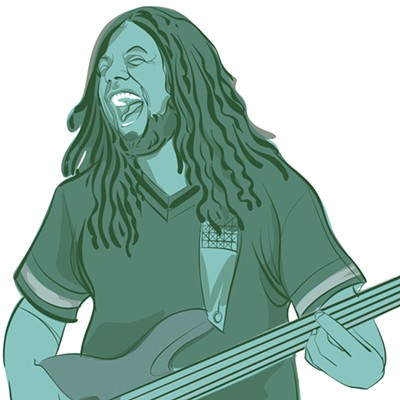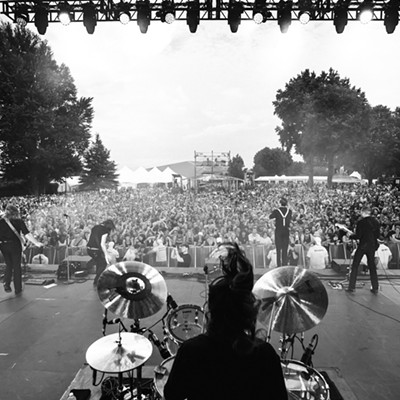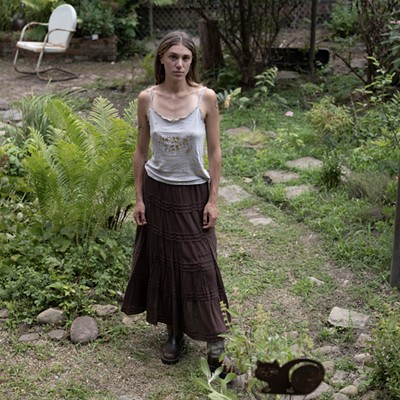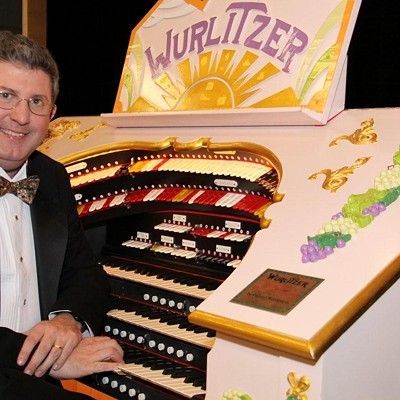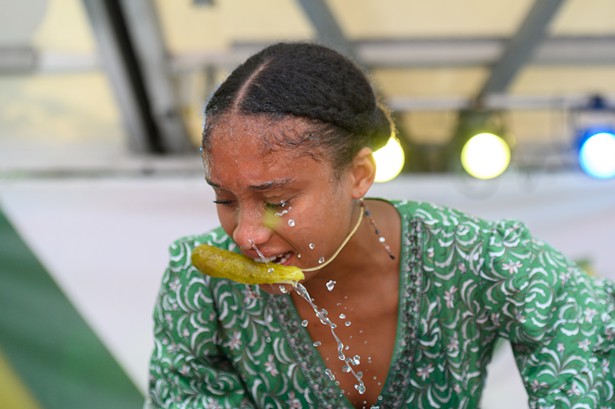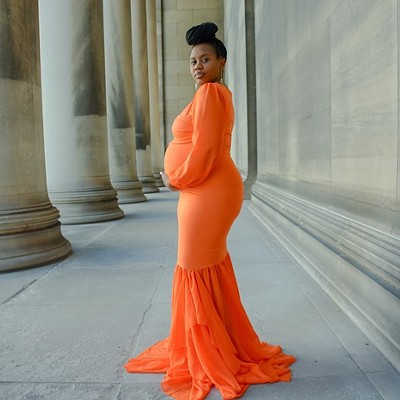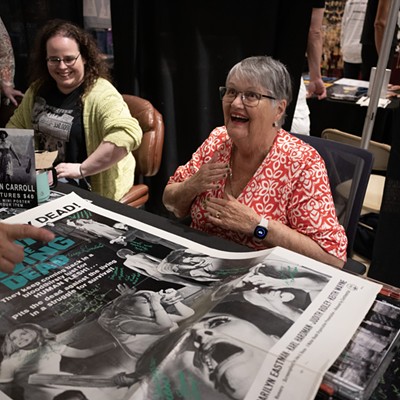Hip-hop artist Blak Rapp Madusa brings her mix of art and activism to Ladyfest Pittsburgh
Message-driven art always runs the risk of feeling flat, but Steel Waters Run Deep is gorgeous, tough, spiritual and overflowing with pain and love
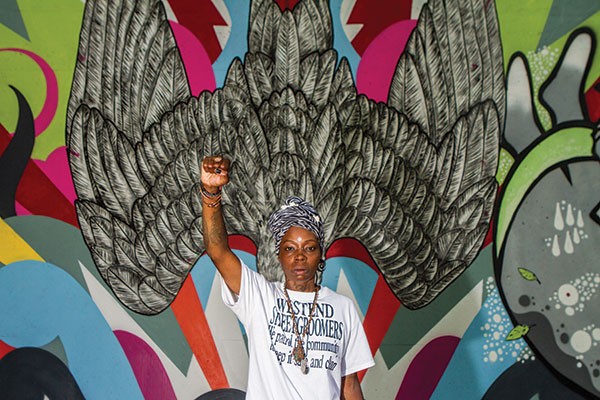
If you don’t know: Blak Rapp Madusa
BLAK RAPP MADUSA with JACQUEA MAE, LOVE DUMPSTER, more.
9 p.m. Fri., July 15. Howlers, 4509 Liberty Ave., Bloomfield. $8. 412-682-0320. Part of LADYFEST PITTSBURGH. Fri., July 15 through Sun., July 17. Various locations and admission prices. Visit facebook.com/
Vulvapalooza for more information and full schedule.
Vulvapalooza for more information and full schedule.
[
{
"name": "Local Action Unit",
"component": "24929589",
"insertPoint": "3",
"requiredCountToDisplay": "1"
}
]
“True repair comes from reparation/Blak Madusa tryna save the nation.”
From the first moments of her 2015 record Steel Waters Run Deep, it’s obvious that Blak Rapp Madusa isn’t just spitting words. These are cries of rage and frustration at white supremacy and this country’s seemingly insurmountably racist foundation. (“Is this you or is this me?” she asks on that record. “Is it hatred that has been deep-seated for eons, or is this something that you came up with?”) But just as often, they’re expressions of radical encouragement and wisdom for Black America.
While hip hop has always had political roots, the advent of the Black Lives Matter movement inspired a fresh wave of social consciousness in mainstream rappers. “To be an artist … you actually have to be depicting the times,” Madusa says. “[But] some groups, though they may be politically conscious, it doesn’t seem like the force behind their work.”
In other words, plenty of artists have a message. Madusa aims to be a revolutionary.
“Planting seeds of truth all over this land hoping that you … would come forth and take this torch and run on my friend.”
For Madusa (an acronym for Making a Difference Using Skills and Activism), music and activism are inextricably entwined. The Atlanta-based artist — who prefers to call herself an artivist — spends much of her time organizing and performing at rallies and events. Earlier this summer, for example, she took her Artivist Vanguard tour on the road, and worked with Black Lives Matter Knoxville to organize an event called Solidarity in Liberation.
“The difference between the [artist and the] artivist is that we’re actually going to do something about it, we’re going to create an event, we’re going to create a rally, we’re going to create a space where people can come and learn more,” she says. If you’re looking for good music, good lyrics, a good performance, Madusa — who comes to Pittsburgh this weekend to perform as part of the annual three-day Ladyfest Pittsburgh music festival — will deliver. But, she says, “it’s a lot more than that. It’s kind of a holistic setting.”
Message-driven art always runs the risk of feeling flat, but Steel Waters Run Deep is gorgeous, tough, spiritual and overflowing with pain and love. Madusa’s voice recalls the slightly husky timbre and emotional range of Lauryn Hill; her flow echoes the cool, easy confidence of hip hop’s most-revered East Coast alpha males. Lyrically, she pulls no punches, proclaiming, “We already at war, underneath attack cause we’re black and we’re poor, so when you gonna react?” Then she quotes Biggie better than Biggie: “If you don’t know, now you know.”
“My third eye has already been woke.”
Madusa’s activism was born in the mid-2000s when, as a student at the University of Pittsburgh, she participated in her first protest, a rally against police brutality. From there, Pittsburgh remained a powerful backdrop for the Harrisburg-born, Houston-raised artist’s development. “It’s cold a lot … I spent a lot of time inside,” she recalls with a laugh. Pittsburgh’s racial dynamic also made an impression. “Even though the South is the South, I’ve experienced more racism in Pittsburgh,” she says. “So that inspired a lot.”
Spoken-word performance initially became an outlet, and she found support from celebrated artist and activist Vanessa German. “It was Vanessa who actually encouraged me to work and to also not be shy about it,” Madusa recalls. A return to Houston led to a serendipitous run-in with a record producer, who suggested she turn her poetry into rhymes. His company, Trickle Down Entertainment, released her first single.
On visits back to Pittsburgh, rapper Yah Lioness helped Madusa hone her skills with concentrated writing sessions. She also joined up with Pittsburgh hip-hop collective 1Hood, which put her in front of a larger audience and provided an activist support system.
She still counts herself as part of 1Hood, which itself aims to build communities and promote political awareness. But living in Atlanta has inspired Madusa in new ways. “It’s the cradle of civil rights,” she notes. “There’s things going on, a lot of movements building.” It’s in Atlanta where she has really seen her two passions become enmeshed. Before then, she says, “I had just kind of been a hip-hop artist … I hadn’t really been [fully embracing] the whole activist part.”
“All this to say that we can make something out of nothing / We can take your dreams and mine and merge them into reality / Burst them into flames like shooting stars in the galaxy."
I talked to Madusa by phone early in the week of July 4 — a moment when it was a little easier to speak more generally about matters of racism and police brutality. But by the time we spoke again, briefly, the following Friday, the sickening triple punch of Alton Sterling, Philando Castile and the Dallas sniper attack had hit us all like a late-round uppercut in a fight that already feels too exhausting to finish.
“I don’t even know what to say right now,” Madusa said, her voice thick with emotion. She echoed her own lyrics, decrying white supremacy and systemic racism, also expressing faith that this painful era will end. She herself puts it best at the end of her record:
"We can make ourselves whole again / We can bring our souls home again / Just you take my hand and let us lead ourselves out of the darkness of this oppression."
From the first moments of her 2015 record Steel Waters Run Deep, it’s obvious that Blak Rapp Madusa isn’t just spitting words. These are cries of rage and frustration at white supremacy and this country’s seemingly insurmountably racist foundation. (“Is this you or is this me?” she asks on that record. “Is it hatred that has been deep-seated for eons, or is this something that you came up with?”) But just as often, they’re expressions of radical encouragement and wisdom for Black America.
While hip hop has always had political roots, the advent of the Black Lives Matter movement inspired a fresh wave of social consciousness in mainstream rappers. “To be an artist … you actually have to be depicting the times,” Madusa says. “[But] some groups, though they may be politically conscious, it doesn’t seem like the force behind their work.”
In other words, plenty of artists have a message. Madusa aims to be a revolutionary.
“Planting seeds of truth all over this land hoping that you … would come forth and take this torch and run on my friend.”
For Madusa (an acronym for Making a Difference Using Skills and Activism), music and activism are inextricably entwined. The Atlanta-based artist — who prefers to call herself an artivist — spends much of her time organizing and performing at rallies and events. Earlier this summer, for example, she took her Artivist Vanguard tour on the road, and worked with Black Lives Matter Knoxville to organize an event called Solidarity in Liberation.
“The difference between the [artist and the] artivist is that we’re actually going to do something about it, we’re going to create an event, we’re going to create a rally, we’re going to create a space where people can come and learn more,” she says. If you’re looking for good music, good lyrics, a good performance, Madusa — who comes to Pittsburgh this weekend to perform as part of the annual three-day Ladyfest Pittsburgh music festival — will deliver. But, she says, “it’s a lot more than that. It’s kind of a holistic setting.”
Message-driven art always runs the risk of feeling flat, but Steel Waters Run Deep is gorgeous, tough, spiritual and overflowing with pain and love. Madusa’s voice recalls the slightly husky timbre and emotional range of Lauryn Hill; her flow echoes the cool, easy confidence of hip hop’s most-revered East Coast alpha males. Lyrically, she pulls no punches, proclaiming, “We already at war, underneath attack cause we’re black and we’re poor, so when you gonna react?” Then she quotes Biggie better than Biggie: “If you don’t know, now you know.”
“My third eye has already been woke.”
Madusa’s activism was born in the mid-2000s when, as a student at the University of Pittsburgh, she participated in her first protest, a rally against police brutality. From there, Pittsburgh remained a powerful backdrop for the Harrisburg-born, Houston-raised artist’s development. “It’s cold a lot … I spent a lot of time inside,” she recalls with a laugh. Pittsburgh’s racial dynamic also made an impression. “Even though the South is the South, I’ve experienced more racism in Pittsburgh,” she says. “So that inspired a lot.”
Spoken-word performance initially became an outlet, and she found support from celebrated artist and activist Vanessa German. “It was Vanessa who actually encouraged me to work and to also not be shy about it,” Madusa recalls. A return to Houston led to a serendipitous run-in with a record producer, who suggested she turn her poetry into rhymes. His company, Trickle Down Entertainment, released her first single.
On visits back to Pittsburgh, rapper Yah Lioness helped Madusa hone her skills with concentrated writing sessions. She also joined up with Pittsburgh hip-hop collective 1Hood, which put her in front of a larger audience and provided an activist support system.
She still counts herself as part of 1Hood, which itself aims to build communities and promote political awareness. But living in Atlanta has inspired Madusa in new ways. “It’s the cradle of civil rights,” she notes. “There’s things going on, a lot of movements building.” It’s in Atlanta where she has really seen her two passions become enmeshed. Before then, she says, “I had just kind of been a hip-hop artist … I hadn’t really been [fully embracing] the whole activist part.”
“All this to say that we can make something out of nothing / We can take your dreams and mine and merge them into reality / Burst them into flames like shooting stars in the galaxy."
I talked to Madusa by phone early in the week of July 4 — a moment when it was a little easier to speak more generally about matters of racism and police brutality. But by the time we spoke again, briefly, the following Friday, the sickening triple punch of Alton Sterling, Philando Castile and the Dallas sniper attack had hit us all like a late-round uppercut in a fight that already feels too exhausting to finish.
“I don’t even know what to say right now,” Madusa said, her voice thick with emotion. She echoed her own lyrics, decrying white supremacy and systemic racism, also expressing faith that this painful era will end. She herself puts it best at the end of her record:
"We can make ourselves whole again / We can bring our souls home again / Just you take my hand and let us lead ourselves out of the darkness of this oppression."






